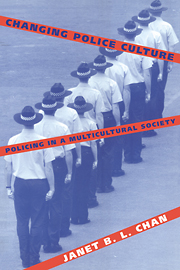Book contents
- Frontmatter
- Contents
- List of Figures
- List of Tables
- Acknowledgements
- Abbreviations
- Introduction
- 1 Policing in a Multicultural Society
- 2 Discrimination and Police Work
- 3 Strategies for Change
- 4 Re-examining Police Culture
- 5 Police and Minorities in New South Wales
- 6 Under New Management
- 7 Ethnic Affairs Policy Statement: The Paper Chase
- 8 Cop It Sweet: Reform by Media
- 9 Processes and Outcomes of Change
- 10 Changing Police Culture
- Bibliography of Works Cited
- Index
9 - Processes and Outcomes of Change
Published online by Cambridge University Press: 04 November 2009
- Frontmatter
- Contents
- List of Figures
- List of Tables
- Acknowledgements
- Abbreviations
- Introduction
- 1 Policing in a Multicultural Society
- 2 Discrimination and Police Work
- 3 Strategies for Change
- 4 Re-examining Police Culture
- 5 Police and Minorities in New South Wales
- 6 Under New Management
- 7 Ethnic Affairs Policy Statement: The Paper Chase
- 8 Cop It Sweet: Reform by Media
- 9 Processes and Outcomes of Change
- 10 Changing Police Culture
- Bibliography of Works Cited
- Index
Summary
By the early 1990s, the New South Wales Police Service had undergone almost a decade of change. The question I will turn to in this chapter is: what has all this activity actually achieved? It is easy to be dazzled by the proliferation of symbolic enterprises – the glossy corporate mission and strategic plans, the streamlining and restructuring, the surveys and the statistics, as well as the ‘newspeak’ among management consultants and senior officers. With so much ‘happening’ within the organisation, there is a temptation to assume that ‘it's all happening’. On the other hand, it would be equally easy to point to Cop It Sweet or the report on Racist Violence and pass the verdict that ‘nothing has changed’ in spite of all these activities.
The purpose of this chapter is to assess what has been achieved in the relations between police and minorities following almost a decade of organisational change. It must be recognised that what is presented is by no means a comprehensive picture; it is merely the best picture that can be put together with the available evidence. The focus of the assessment is also fairly restrictive in that there is no attempt to describe the full impact of organisational change on all aspects of policing in New South Wales. Even with a narrow focus, the assessment task was not easy, given the absence of ongoing, systematic monitoring of policy outcomes in this area either by the Police Service or by some external body. This difficulty illustrates the way change has been implemented: the lack of monitoring, feedback, and organisational learning is patently one of the weaknesses of the reform program.
- Type
- Chapter
- Information
- Changing Police CulturePolicing in a Multicultural Society, pp. 188 - 222Publisher: Cambridge University PressPrint publication year: 1997

